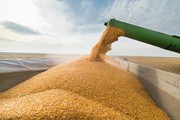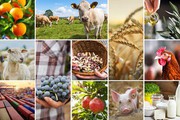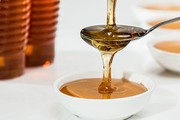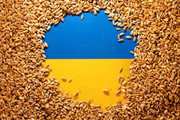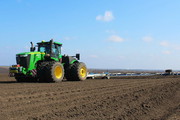News
Louis Dreyfus to stop exporting Russian grain from July 1
The French agricultural trading giant Louis Dreyfus will stop exporting Russian grain from July 1, the company said in a statement on Monday.
- Read more
- 703 reads
Short-term outlook report: war in Ukraine continues to impact EU farmers
The negative impacts of Russia’s invasion of Ukraine, and the ensuing high input costs and food inflation, continue to weigh on agricultural markets and consumers’ purchasing decisions. In addition, large parts of the EU experienced winter droughts after the hot and dry summer of last year, further worsening water availability in regions with already record low water reservoirs. This might lead impacted farmers to substitute away from more water-intensive crop cultures. The current EU macroeconomic forecast is relatively more positive than in autumn 2022, despite uncertainties about energy supply for next winter and recent financial market tensions. High commodity prices last year helped countering high input costs and farm income increased on average, with significant sectorial and regional disparities.
- Read more
- 784 reads
Agricultural Production in Ukraine to Recover with World Bank Support
Funds in the amount of $132 million available for programs, including access to finance for small farmers.
- Read more
- 784 reads
Nearly half of honey in European markets is fake, according to EU investigation
Nearly half of the honey imported into the European Union is suspected of being fake, according to an EU probe.
The research, spearheaded by the European Commission’s Anti-Fraud Office (OLAF) and the Joint Research Centre (JRC), revealed the massive fraud and that many may be buying counterfeit honey labelled as authentic.
- Read more
- 649 reads
Second ‘war’ sowing campaign: less grain, more oil crops projected
In 2023, Ukrainian farmers plan to increase oil crop area and partially reduce grain and corn area.
- Read more
- 947 reads
Polish, Romanian PMs ask EU for mechanism to trace Ukraine grain exports
Romania and Poland are in talks with the European Commission over export tracing mechanisms for Ukrainian grains to ensure local farmers are not hurt by a flood of cheap imports, the Polish and Romanian prime ministers said on Tuesday.
Ukraine, one of the world's largest grain exporters, has seen its Black Sea ports blocked since Russia invaded more than a year ago and has been forced to find alternative shipping routes through European Union states Poland and Romania.
- Read more
- 609 reads
The Road to Restoration: Post-War Recovery of the Ukrainian Agricultural Sector
The war started by Russia against Ukraine has left its mark on the country’s economy, particularly on agriculture. The disruption of supply chains and agricultural production has already caused significant damage to the people, the economy, and the environment of Ukraine. Despite these difficulties, the country faces the task of restoring the agriculture sector and making it sustainable.
- Read more
- 577 reads
Bulk carrier with 30,000 tonnes of humanitarian wheat for Yemen is moving along the “grain corridor” (Updated)
The bulk carrier NEGMAR CICEK, the sixth vessel under the Grain From Ukraine programme, has left the port of Chornomorsk and joined the caravan of three other vessels.
Yemen is a country in Asia that is suffering from a food crisis. The country will receive 30,000 tonnes of humanitarian Ukrainian wheat thanks to donations from the governments of the United States, France, and Spain.
- Read more
- 530 reads
Astarta is one of the key food suppliers for the UN World Food Programme in Ukraine
After a year of cooperation with the UN World Food Programme (UN WFP), Astarta has become one of its key food suppliers for humanitarian purposes in Ukraine.
- Read more
- 564 reads
Grain Initiative: The 17th vessel chartered by the UN World Food Programme leaves the port of Odesa
The DENIZ M bulk carrier will deliver 30,000 tonnes of humanitarian wheat to Ethiopia. Under the auspices of the WFP, more than half a million tonnes of Ukrainian wheat have already been delivered to needy countries in Africa and Asia.
- Read more
- 680 reads
